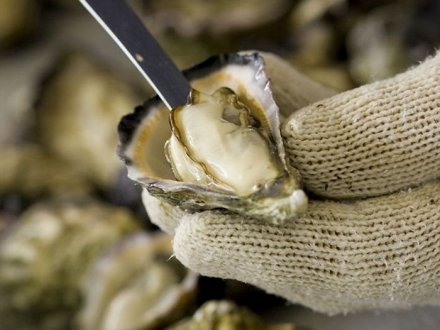 Aquaculture Conference in Adelaide have unveiled a draft code for growing seafood sustainably. The new code would provide labelling, sourcing and certification benchmarks for the seafood industry, globally.
Aquaculture Conference in Adelaide have unveiled a draft code for growing seafood sustainably. The new code would provide labelling, sourcing and certification benchmarks for the seafood industry, globally.Presenter: Caroline Winter
Speaker: Graham Mair, president, World Aquaculture Society; Dr Pia Winberg, marine systems ecologist, Woollongong University; Herman Weiss, program manager, Global Sustainable Seafood Initiative; Patrick Hone, Fisheries Research and Development Corporation;
CAROLINE WINTER: Aquaculture is one of the world's fastest growing food sectors.
The United Nations recently estimated that global food production from fish farming expanded almost 12-fold in the past 30 years.
Graham Mair is President of the World Aquaculture Society.
GRAHAM MAIR: By the end of this century - so in other words within the next 85 years - we have to produce the same amount of food that we produced in total over the last 10,000 years. So we've got a huge task and clearly aquaculture is going to play a major role in food security around the world.
CAROLINE WINTER: Graham Mair is also chair of the World Aquaculture Conference in Adelaide, where 2,000 delegates from 70 countries have gathered to discuss the future of the industry.
GRAHAM MAIR: World aquaculture already stands at about 70 million tonnes, with about $100 billion of value. We employ around 54 million people across the world directly and some of the talks have highlighted that it's estimated around 12 per cent of the global population is dependent in some way on the seafood industry.
CAROLINE WINTER: It's that dependence and expected growth in demand that has dominated the conference.
Much of the focus has been given to new industries which continue to mature, like oyster farms and yellowtail kingfish, but also to emerging markets like seaweed and algae.
Dr Pia Winberg is a marine systems ecologist from Wollongong University.
PIA WINBERG: Australia has a unique opportunity that it's missing out on a little bit because it's focussed on continuing R&D in isolation of industry linkages, and we really need to be a bit more innovative in the frontier of jumping out of academic institutions into the real world.
CAROLINE WINTER: Globally seaweed is a $6 billion industry and a versatile one at that. It's harvested to make food, medicine, supplements, and skin care among other things.
Dr Pia Winberg again:
PIA WINBERG: Nutritional security is a part of food security, is the first and foremost objective, but in the future - the planet is 70 per cent ocean - we will be needing seaweed to contribute to our food supply at scale as we grow in population, but also to remediate the other marine aquaculture industries.
CAROLINE WINTER: While seaweed and other niche industries are still a way of providing sustainable food in Australia, international experts are looking at ways of instilling confidence and trust in the current industry.
The Global Sustainable Seafood Initiative was set up to establish a consistent benchmark for the labelling, sourcing, and certification of seafood.
Herman Wisse is the group's program manager.
HERMAN WISSE: There's a lot of different certification schemes and claims out there, which is causing general confusion within the market place - whether its farmers and fishermen or the retailers - which of these programs can be used to ensure and assure that there is a credible and responsible sourcing of their fish?
CAROLINE WINTER: The guidelines, now in a draft form, will ensure the development of the seafood industry is compatible with the environment, from the farm or ocean to the plate.
Patrick Hone is executive director of the Fisheries Research and Development Corporation in Australia.
He says consumers are far more socially responsible these days and consistent guidelines will make a difference.
PATRICK HONE: People are very interested in making sure that what we do meets their values, meets their expectations, and so sustainability and demonstration of sustainability is a very important thing to the consumer and rightly so. Because we've had lots of stories in the past where people have not done the right thing and the environment has suffered.





